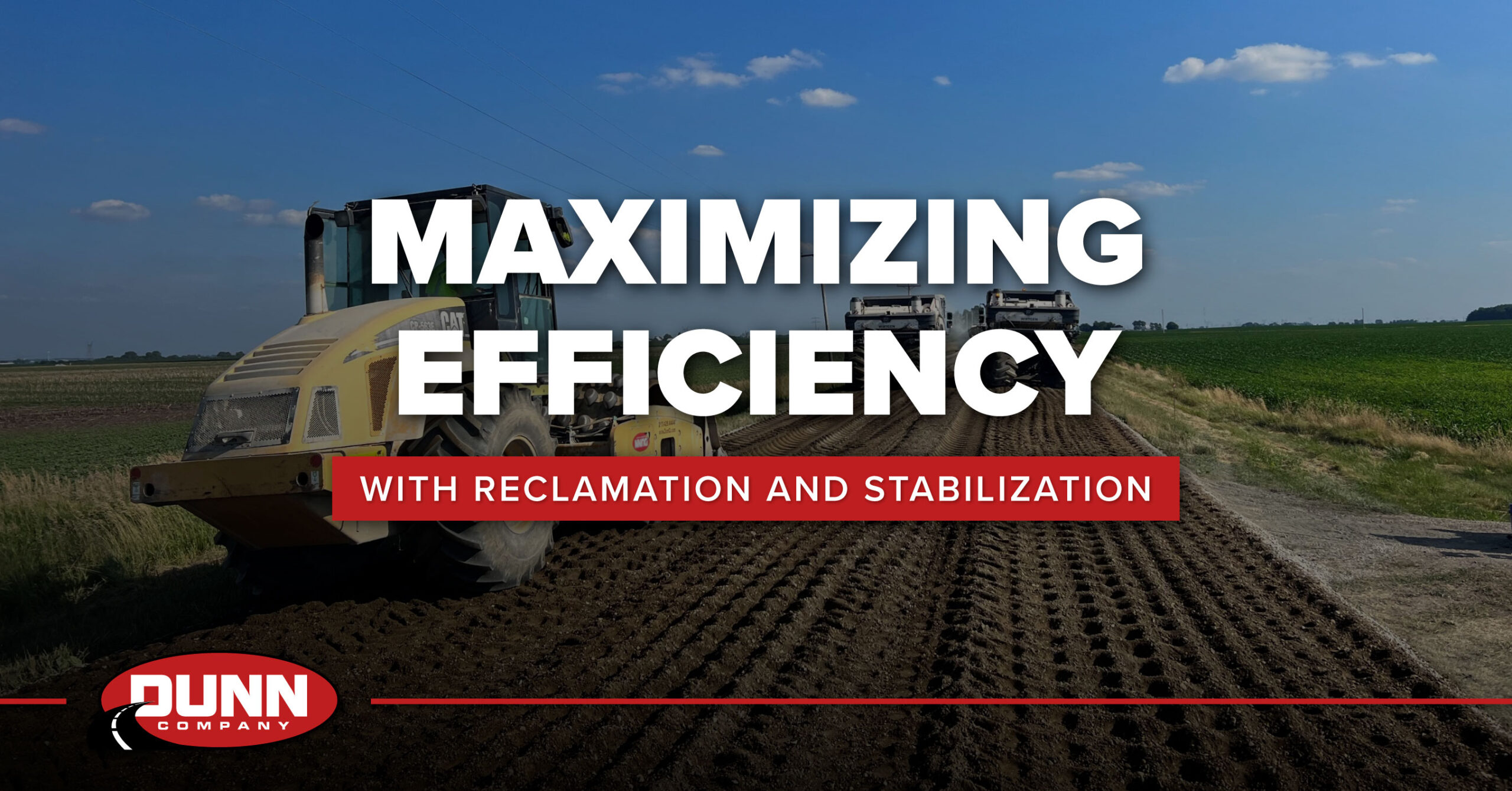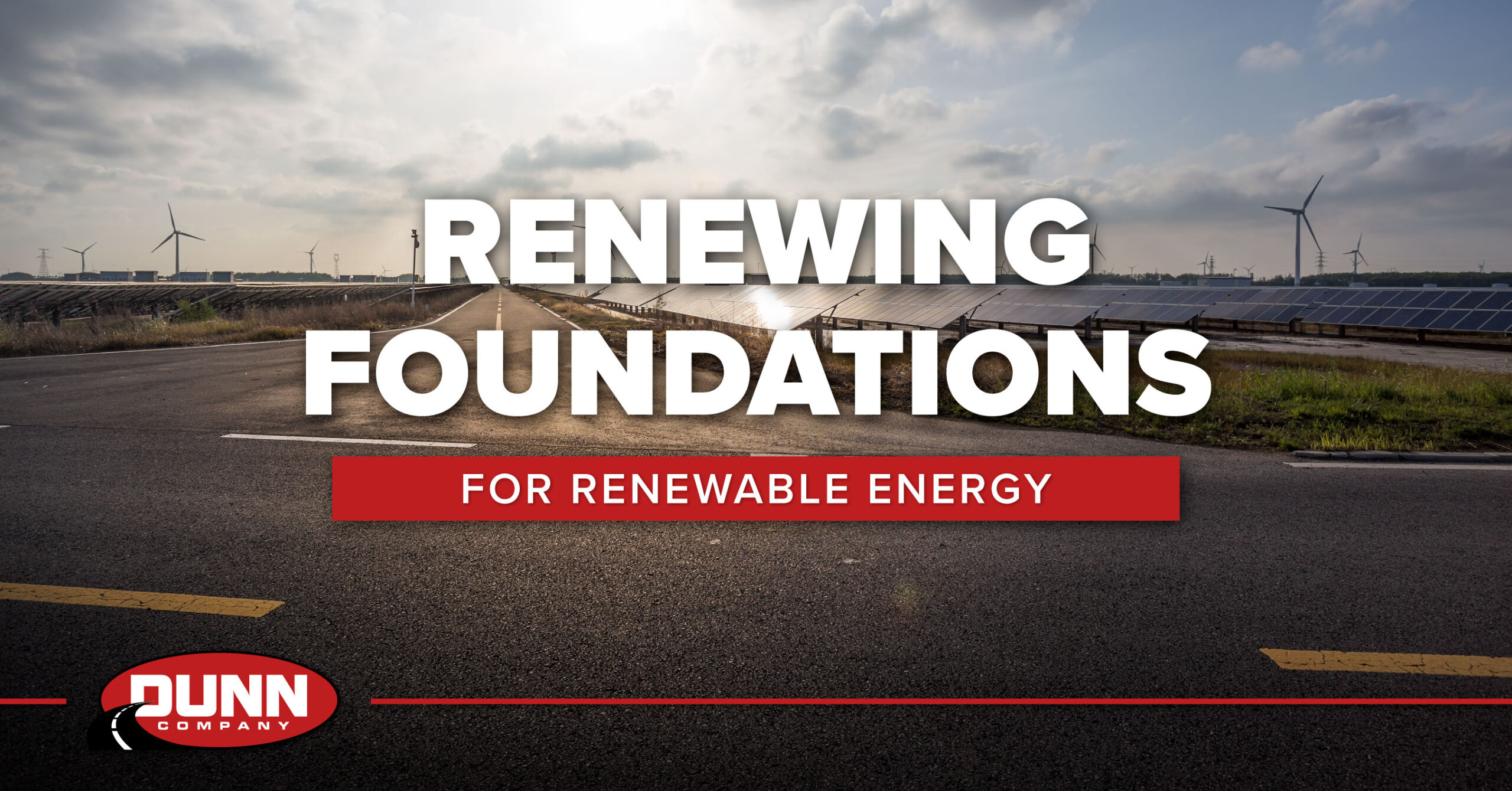Month: April 2025

Maximizing Efficiency with Reclamation and Stabilization
When it comes to road construction, efficiency, cost-effectiveness, and sustainability are key. Whether you’re working on highways, local roads, or parking lots, Full Depth Reclamation (FDR) and Soil Stabilization are two innovative techniques that can help you achieve lasting results while saving time, money, and resources. In this article, we’ll explore both methods and highlight their advantages for road reconstruction projects.
What is Full Depth Reclamation (FDR)?
Full Depth Reclamation (FDR) is an advanced road construction technique that involves recycling the existing asphalt and base materials on-site to create a new, stable road base. The process eliminates the need to transport old materials off site, reducing transportation costs, material waste, and environmental impact.
The FDR Process:
- Pulverization: The first step in FDR involves pulverizing the existing asphalt and underlying base materials using specialized machinery. This step creates a consistent, uniform material that can be further processed.
- Mixing and Stabilization: After pulverization, the recycled material is mixed with stabilizing agents such as cement, lime, or emulsion. This mixture helps strengthen the base layer, making it more durable and resistant to environmental stressors.
- Compaction: The stabilized material is then compacted to create a strong, stable foundation that is ready for a new surface layer.
- Paving and Finishing: Once the base has been properly compacted, a new layer of asphalt is applied to complete the project, providing a smooth, durable surface for traffic.
Key Benefits of Full Depth Reclamation (FDR)
- Cost Savings: By reusing existing materials, FDR eliminates the need for new materials and transportation, significantly reducing project costs. This method can save 40% to 80% compared to traditional road reconstruction.
- Time Efficiency: FDR typically requires less time to complete than traditional reconstruction methods. Since the materials are recycled on-site, the construction process is faster, reducing disruptions and allowing roads to be reopened sooner.
- Environmental Benefits: FDR promotes sustainability by recycling materials that would otherwise be taken off site. It reduces the carbon footprint associated with the extraction, transportation, and disposal of raw materials.
- Improved Road Performance: FDR strengthens the base layer, improves the structural coefficiency, integrity and lifespan of the road efficiently. It also reduces issues such as cracking, ruts, and surface distress, resulting in a smoother, more durable surface for years to come.
Understanding Soil Stabilization
Soil stabilization is the process of improving the strength and durability of soil to create a more solid foundation for road construction. By stabilizing the soil, construction teams can ensure that the road base remains strong, even under heavy loads and varying weather conditions.
Methods of Soil Stabilization:
- Mechanical Stabilization: This method involves physical processes such as compaction. Mechanical stabilization is ideal for improving soil strength and density quickly and efficiently.
- Chemical Stabilization: In this process, stabilizing agents like cement, lime, or fly ash are mixed with the soil to alter its chemical properties. This improves the soil’s load-bearing capacity and resistance to moisture and erosion.
Benefits of Soil Stabilization
- Improved Load-Bearing Capacity: Stabilized soil can support heavier loads, reducing the risk of settlement or road failure, especially in areas with soft or unstable soil.
- Enhanced Durability: Stabilized soil is more resistant to erosion, moisture infiltration, and weathering, which improves the overall durability of the road or structure built on top of it.
- Cost Savings: By stabilizing the soil in place, you reduce the need for extensive excavation or replacement, saving both time and money.
- Environmental Sustainability: Soil stabilization reduces the need for new materials, lowering the environmental impact and preserving natural resources. It also minimizes waste by reusing existing soil.
Your Trusted Partner in FDR & Stabilization
At Dunn Company, we specialize in Full Depth Reclamation and Soil Stabilization, offering these services to municipalities, contractors, and construction teams across Illinois and the Midwest. With years of experience and the latest technology, we provide high-quality, cost-effective solutions that ensure your road construction projects are completed on time, within budget, and with lasting results.
Whether you’re looking to rehabilitate an old road or create a stable foundation for new construction, Dunn Company is here to help. Contact us today to learn more about how FDR and soil stabilization can benefit your next project.

Renewing Foundations for Renewable Energy
As the push for renewable energy continues to grow, wind and solar farm projects face a unique set of challenges. These large-scale infrastructure projects require careful planning and execution to ensure they are built on solid, sustainable foundations that can withstand the heavy equipment involved, environmental factors, and the demands of the energy sector.
One of the key elements in the successful construction of renewable energy projects is ensuring the proper stabilization of soils, building robust access roads, and improving local infrastructure to handle the weight and movement of heavy machinery. For engineers and construction professionals, making the right choices early on can ensure efficiency, cost-effectiveness, and longevity, ultimately reducing the project’s carbon footprint.
Soil Stabilization for Renewable Energy Projects
The first critical step in preparing for any renewable energy project is soil stabilization. Without a solid base, any road infrastructure will quickly degrade, especially under the weight of the heavy cranes, turbine components, and other equipment that must be transported on-site. Soil stabilization serves as the foundation for a durable and long-lasting road system.
Stabilizing the soil to withstand the harsh conditions of these projects often involves soil-cement stabilization, which is an environmentally friendly and cost-effective solution. Cement stabilization is particularly beneficial for roads that will be exposed to dynamic loads and frequent heavy equipment transport, such as those in wind and solar farm construction.
For engineers, it is essential to conduct geotechnical studies to assess the soil type and determine the most effective cement ratio for stabilization. This ensures the mixture is tailored to the varying terrain conditions, maximizing the strength and durability of the soil. The design process should also take into account drainage, as water retention can weaken stabilized layers and lead to costly repairs down the line. By incorporating additives like fly ash or lime, roads can gain enhanced resistance to moisture-related damage, providing long-term durability.
Once the soil is stabilized, field testing is often performed to validate the strength of the stabilized road base. Common tests, such as California Bearing Ratio (CBR) and Unconfined Compressive Strength (UCS), help to determine whether the stabilized soil will meet the performance standards required for the project.
Building Access Roads for Heavy Equipment
In addition to the soil stabilization, creating access roads for large machinery is another crucial step in the construction process. These roads are necessary for the transportation of turbine components, cranes, and solar panels, all of which are too heavy and large to be transported on standard roads. Access roads must be designed to handle these heavy loads without deteriorating under the stress.
The road construction process involves more than just pouring asphalt, it requires proper thickness and reinforcement to ensure that these access roads can handle the load-bearing requirements. Engineers need to consider structural design that takes into account the specific needs of transporting large equipment and providing access to remote areas.
In addition, the use of cement stabilization for these access roads ensures that they remain strong and durable, even in harsh weather conditions. This approach prevents common issues such as erosion, cracks, and ruts, which can significantly increase maintenance costs and disrupt operations.
Improving Infrastructure for Long-Term Sustainability
When working on renewable energy projects, there is often a need to improve existing local infrastructure. Public roads and local access roads must be reinforced to allow for the movement of heavy equipment while also supporting long-term use and maintenance. Roadways must be designed with proper drainage systems to prevent water buildup, which could weaken the integrity of the roadbed. The goal is to ensure that these roads can withstand the harsh environmental conditions while providing reliable access to the project site.
Improving these roads, especially in rural areas where many renewable energy projects are located, helps local municipalities maintain infrastructure that benefits not only the energy project but also the surrounding community. Dunn Company works closely with local authorities and engineers to ensure that the necessary road improvements are made in accordance with project timelines while adhering to all safety and environmental regulations.
Reducing Environmental Impact with Full Depth Reclamation and Cold In-Place Recycling
Sustainability is at the heart of renewable energy projects, and this goal should extend to the construction process as well. One effective way to reduce the environmental impact is by incorporating techniques like Full Depth Reclamation (FDR) and Cold In-Place Recycling (CIR). These methods minimize the use of new materials by reusing existing asphalt and base materials, reducing both the cost and the carbon footprint of the project.
Integrated Carbon Emissions from Asphalt Pavement Regeneration (www.mdpi.com)
FDR is particularly useful for projects that require extensive road rehabilitation, as it pulverizes the existing pavement and mixes it with stabilizing agents to create a new, stronger road base. CIR similarly helps by milling existing asphalt and reusing it, reducing the need for new aggregates and reducing the carbon footprint associated with material transportation.
Both of these techniques contribute to lowering transportation costs and reducing construction waste, aligning perfectly with the sustainability goals of renewable energy projects. By using these innovative methods, renewable energy projects can significantly reduce their environmental impact while still meeting the durability and performance needs of the project.
A Comprehensive Approach for Renewable Energy Projects
Renewable energy projects require a comprehensive and cohesive approach to site preparation, from soil stabilization to access roads and local infrastructure improvements. By addressing the unique challenges of heavy equipment transport, road durability, and environmental concerns, engineers and contractors can help ensure the long-term success of the project.
Working with Dunn Company provides an opportunity to utilize industry-leading techniques and innovative approaches to reduce costs, minimize environmental impact, and ensure that the necessary infrastructure is in place for long-term sustainability.
Our expertise in soil stabilization, access road creation, and full-service infrastructure improvements makes us a trusted partner for your renewable energy projects. With the right planning and execution, your renewable energy projects can achieve their full potential, benefiting the environment, your business, and the communities they serve.
Contact a Dunn Company representative today to learn more about how we can help with your next project.

Why Choose Asphalt for Your Home’s Driveway
When it comes to your driveway, choosing the right pavement type can make a significant difference in both the aesthetic and functional aspects of your property. While there are several options available, asphalt pavement stands out as one of the best choices for many homeowners. Here’s why asphalt pavement should be at the top of your list when considering a driveway for your home.
Durability You Can Count On
Asphalt driveways are known for their durability and longevity. Properly designed and constructed, an asphalt pavement will withstand harsh weather conditions, heavy traffic, and the wear and tear of everyday life. Whether you’re dealing with freezing winters or hot summers, asphalt pavement maintains its structural integrity.
Cost-Effective Solution
Asphalt pavement is frequently more economical to install compared to alternatives, making it an affordable option for homeowners. Additionally, asphalt driveways are also more economical to maintain. With proper maintenance, sealing, crack-filling, and other minor repairs, an asphalt driveway can provide greater value without the hefty upfront costs.
Quick Installation
If you’re looking to get your driveway paved quickly, asphalt is the way to go. The installation process for asphalt pavement is typically faster compared to other materials. Most residential asphalt driveways can be installed within a few days, and you’ll have full use of the driveway in a short amount of time. This makes asphalt a convenient option if you want to avoid long construction times and the disruption that comes with it.
Low Maintenance
Asphalt driveways are known for their low maintenance requirements. Routine maintenance, such as resealing and filling in cracks, is all that’s needed to keep your driveway in great shape. The durability of asphalt pavement and ease of care, save you time and money.

Aesthetic Appeal
An asphalt driveway offers a sleek, smooth, and uniform look, which adds curb appeal to any home. It’s easy to customize the finish of an asphalt driveway to complement the overall look of your home. Asphalt pavement provides a rich, black color that enhances the appearance of your property. You can easily refresh this look by having sealer applied when needed. The asphalt’s smooth surface and dark color also make removing snow and ice more efficient.
Environmentally Friendly
The Environmental Protection Agency (EPA) recognizes asphalt pavement as one of the most-recycled materials in the United States. In addition, far less energy is required to produce asphalt than alternative pavement materials. These factors make asphalt a sustainable choice for new construction, renovations, and repairs. By choosing asphalt, you’re supporting a product that not only delivers durability and performance but also minimizes its environmental impact over its lifecycle.
Why Asphalt Makes Sense for Your Home
When it comes to choosing a driveway material for your home, asphalt pavement offers a range of benefits. It’s durable, cost-effective, and requires minimal maintenance, making it a practical solution for homeowners looking for a long-lasting, low-maintenance option. Additionally, asphalt’s quick installation and aesthetic appeal make it an ideal choice for those who want a quality driveway that enhances the value of their property.
If you’re looking to pave your driveway, don’t hesitate to consider asphalt as your top choice. Contact us today for an evaluation. Our time-tested process allows us to understand your needs in order to design and build you the best, most cost-effective solution. At Dunn Company, we specialize in residential driveway paving, offering high-quality materials and expert installation to ensure your driveway stands the test of time. That’s the Dunn Advantage, guaranteed.

DUNN COMPANY ACQUIRES ASSETS OF MORSE DRIVEWAYS, REINFORCING LOCAL ASPHALT SERVICES AND STRENGTHENING COMMITMENT TO COMMUNITY

DUNN COMPANY ACQUIRES ASSETS OF MORSE DRIVEWAYS, REINFORCING LOCAL ASPHALT SERVICES AND STRENGTHENING COMMITMENT TO COMMUNITY
Decatur, IL – April 2, 2025 – Dunn Company, a leading regional asphalt paving, milling, stabilization, and recycling contractor, is proud to announce the asset acquisition of Morse Driveways, a local asphalt contractor here in Macon County. This acquisition reinforces Dunn Company’s commitment to serving its local community, focusing on commercial and residential projects throughout the area.
Reinforcing Commitment to Local Service –
“We’re excited to welcome Morse Driveways’ customers into the Dunn Company family,” said David Tyrolt, President of Dunn Company. “We look forward to caring for their driveways and parking lots with the expertise and resources of Dunn Company. We commit to providing our neighbors the high-quality service Dunn Company is known for, and we are honored to be active members of the community. .”
A Stronger, Local Partner– This acquisition demonstrates Dunn Company’s focus on providing asphalt pavement construction and maintenance for driveways and parking lots.
Robby Morse, former owner of Morse Driveways, says, “I am confident that the team at Dunn Company will continue to provide the same level of dependable, high-quality service our customers have come to expect, with the added benefit of their resources and expanded capabilities. I trust that our customers will be in great hands and look forward to the continued success of this transition.”
Continuing Commitment
Dunn Company is dedicated to continuing its legacy of excellence and looks forward to serving both new and existing customers. Our aim is to ensure that every project, large or small, is completed with the same level of reliability and precision that Dunn Company is known for. We remain steadfast in our commitment to building stronger pavements, bases, and communities across Macon County and the Midwest.
About Dunn Company
Founded in 1939, Dunn Company has grown to become one of the leading pavement and base contractors in the region. Specializing in asphalt paving, milling, soil stabilization, full-depth reclamation, cold in-place recycling, and other critical infrastructure services, Dunn Company prides itself on providing dependable, quality service to its clients across the Midwest and right here at home. With a commitment to safety, sustainability, and excellence, Dunn Company has earned a reputation as a leader in the construction industry.

